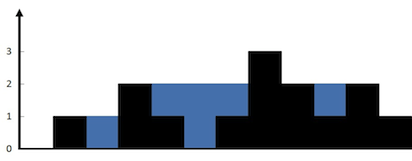Given n non-negative integers representing an elevation map where the width of each bar is 1
, compute how much water it can trap after raining.
Example 1:
Input: height = [0,1,0,2,1,0,1,3,2,1,2,1]
Output: 6
Explanation: The above elevation map (black section) is represented by array [0,1,0,2,1,0,1,3,2,1,2,1]. In this case, 6 units of rain water (blue section) are being trapped.
Example 2:
Input: height = [4,2,0,3,2,5]
Output: 9
Constraints:
n == height.length1 <= n <= 2 * $10^4$0 <= height[i] <= $10^5$
給定一個非負整數陣列 height
每個height[i] 代表在 i 位置的高度
假設每個 height[i] 寬度是 1 單位長度
如果要在位置 i 累積雨水
需要有存在 0 ≤ k < i , i < j ≤ len(height) - 1 使得 min (height[j], height[k]) > height[i]
且累積的雨水面積 = min (height[j], height[k]) - height[i]
要求寫一個演算法算出在給定的 height 中能累積的雨水面積
由雨水累積的條件可以看出
對於每一個位置 i 所能累積的雨水
必須從位置 0 到 i-1 找出一個 k , 使得 height[k]> height[i] 且 是 height[k]從 0 到 i-1 的最大值 leftMax
必須從位置 i+1 到 len(height)-1 找出一個 j , 使得 height[j]> height[i] 且 是 height[j]從 i+1
到 len(height) -1 的 最大值 rightMax
該位置累積的雨水= min(leftMax, rightMax) - height[i]
對於這樣的特性可以使用左右兩個 pointer 來做找尋每個當下的 leftMax, rightMax
並且在遇到有符合 min(leftMax,rightMax) > height[i]累加
具體作法如下
初始化 lp =0, rp = len(height) - 1, leftMax =0 , rightMax = 0 , result = 0
當 lp < rp 時做以下運算
當 height[rp] > height[lp] 代表 左界比較少
檢查 height[lp] > leftMax 決定是否需要累積面積
當 height[lp] > leftMax 時 代表不需要累積水位 更新 leftMax = height[lp]
否則 更新 result += leftMax - height[lp] (累積 lp 水位)
更新 lp += 1
當 height[rp] ≤ height[lp] 代表 右界比較少
檢查 height[rp] > rightMax 決定是否需要累積面積
當 height[rp] > rightMax 時 代表不需要累積水位 更新 rightMax = height[rp]
否則 更新 result += rightMax - height[rp] (累積 rp 水位)
更新 rp -= 1
回傳 result
public class Solution {
public int trap(int[] height) {
int leftMax = 0, rightMax = 0, result = 0;
int lp = 0, rp = height.length - 1;
while (lp < rp) {
if (height[rp] > height[lp]) {
// check lp
if (height[lp] > leftMax) {
leftMax = height[lp];
} else {
result += leftMax - height[lp];
}
lp++;
} else {
if (height[rp] > rightMax) {
rightMax = height[rp];
} else {
result += rightMax - height[rp];
}
rp--;
}
}
return result;
}
}- 要思考出能夠累積雨水的條件
- 要思考出利用 two pointer 來找出每個位置所能累積雨水的關係
- 要思考出如何做最佳的移動方式,因為只有較短的 height 會影響累積雨水的狀況所以先移動較短的部份
- 初始化 lp =0, rp = len(height) - 1, leftMax = 0, rightMax = 0, result = 0
- 當 lp < rp 時 做以下計算
- 當 height[lp] > height[rp] 做以下運算 (rp 是比較低的部份 有機會形成 雨水累積)
- 當 height[rp] > rightMax 時, 更新 rightMax = height[rp] (無法累積雨水) 否則更新 result += rightMax - height[rp]
- 更新 rp -= 1
- 當 height[lp] ≤ height[rp] 做以下運算 (lp 是比較低的部份 有機會形成 雨水累積)
- 當 height[lp] > leftMax 時, 更新 leftMax = height[lp] (無法累積雨水) , 否則更新 result += leftMax - height[lp]
- 更新 lp += 1
- 回傳 result



